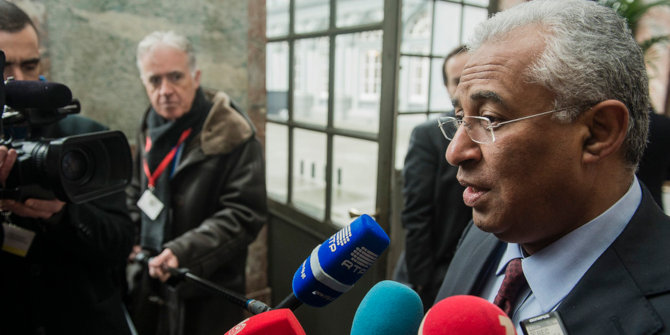The Socialist Party (PS) finished in first place in Portugal’s election on 6 October, ahead of the Social Democratic Party (PSD). In an interview with EUROPP’s Managing Editor Stuart Brown, António Costa Pinto explains what the result means for Portugal, and how the country’s next government might differ from the incumbent left-wing administration that has been in power since 2015.
António Costa Pinto is a Research Professor at the Institute of Social Sciences, University of Lisbon, and Professor of Politics and Contemporary European History at ISCTE-IUL, Lisbon.
Cross-posted from LSE EUROPP

The Socialist Party won the election, but will the party be disappointed that it failed to win a majority in Parliament?
One of the consequences of the success of the parliamentary agreements between the Socialist Party of António Costa, the Left Bloc (BE) and the Communist Party (PCP), who have supported the PS Cabinet over the last four years, is that this political alliance has changed the attitudes of the left-wing electorate in Portugal.
As recent public opinion polls clearly show, the majority of Communist, Left Bloc and Socialist voters now think these agreements were a very good option. This might be the reason why the appeals of the PS during the electoral campaign to give Costa an absolute majority on the basis that the country may need to face an economic slowdown in the European economy did not succeed.
Costa rejected any coalition cabinet with the Left Bloc, giving the negative example of Spain, but in these legislative elections the BE received 9.7% and the PCP 6.5%, blocking that possibility. If we add the consolidation of support for the People Animals and Nature party (PAN), with its 3.7%, it is easy to explain why the Socialists came short by 9 MPs of having a majority in Parliament. Left-wing voters preferred the renewal of the previous agreement to a single Socialist majority.
Many people expect that the Socialists will indeed now renew its agreement with the Left Bloc and the Portuguese Communist Party, but how will the election change the balance of power in the next government?
Costa made clear that he is going to open talks with the Left Bloc, the Communist Party and the People Animals and Nature party in order to secure a stable majority for his cabinet. Let us not forget as well that Portugal is a semi-presidential democracy and the President, who was elected by the centre-right and is extremely popular, will press for a stable majority in Parliament, supporting the new cabinet.
Of course, the electoral victory for the Socialists will provide them with more options. They do not need both the Left Bloc and the Communists. One partner is enough, but Costa will try to have them both. If these parties present difficult conditions for reaching a formal agreement, Costa will form a cabinet regardless, securing the approval of the budget on a yearly basis.
António Costa’s government is often held up as proof that anti-austerity policies can be both politically and economically successful. Is this a fair reflection of the government’s record?
In 2015, Costa had two challenges ahead: first, to convince Portuguese society that a Socialist cabinet backed for the first time by the Communists and the radical left could be stable and moderate, and second, and far more difficult, to balance the budget and decrease the national debt while maintaining all of the country’s agreements with Brussels. At the same time, he had to respect the agreements he had made with the parties on his left.
He was successful thanks in part to economic growth, an unemployment rate that fell to 6%, and a tourist boom. Under tight control from the Finance Minister, Mário Centeno, and with the moderation of his left-wing partners, he did succeed, but part of Portugal’s economic recovery was already on the way when he came to power. He was there at the right moment and he managed it well.
How are the policies of the next government likely to change from what we have seen in the last four years?
Costa will try to maintain the same economic and financial policy. The challenges of the coming years will be the possible slowdown of the European economy and an increase in interest rates. These factors will force his cabinet to adjust, something that he will almost certainly do. Between a return to austerity and ‘spending’ agreements with the political actors to his left, Costa will choose the first option. In this scenario, he will need the backing of the centre-right, which might be problematic.
Where does the Portuguese right go from here?
The party representation of the right in Portugal has been ‘frozen’ since democratisation in 1974, with a small conservative party, the CDS-PP, entering the cabinet in coalition with the PSD each time. Facing a difficult electoral juncture, the head of the CDS-PP, which has been reduced to a 4.3% vote share, resigned, and the PSD, although surviving well with 28%, will face some internal turmoil.
The novelty, though, is that these elections produced a more fragmented party system with two very small parties on the right entering parliament with one MP each and with each winning 1.3% of the vote. These were the ‘Liberal Initiative’, founded by young dissidents of the PSD, and ‘Chega’ (Enough), a populist radical right-wing party led by another dissident of the PSD, who is a sports commentator for the tabloid media. Chega, in particular, exhibit the typical populist focus on crime and immigration. Their agenda does not mobilise much support in Portugal, but entering the parliament will give them a small bonus.
This said, we should moderate any talk about substantial fragmentation in Portugal. The two major parties, the PS and the PSD, which have governed Portugal since democratisation, will hold 185 out of 230 seats in the new parliament, compared to 165 seats in 2015.


Be the first to comment